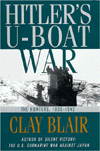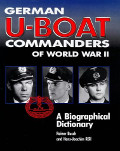Hitler's U-boat War
The Hunters, 1939-1942
Blair, Clay
1996, Random House
ISBN 0394588398
Hardcover, 774 pages, 54 b&w photos
| Type. | General History book |
| Pros. | Detailed and mostly accurate narrative |
| Cons. | Attitude and some selective use of sources. |
| Rating. |  |
 Clay Blair's HITLER'S U-BOAT WAR: THE HUNTERS, covers the Battle of the Atlantic from 1939 to 1942. Mr. Blair is an ex-WWII submariner who has written a number of military histories, including SILENT VICTORY, a fine book about US submarines in World War Two. His latest work, THE HUNTERS, is a comprehensive history of the U-boat campaign against the Allies. This book shows the reader events taking place in the Axis and Allies' headquarters as well as on individual submarines and escorts. Mr. Blair's book takes the controversial stand that "the U-boat peril in World War Two was and has been vastly overblown." This statement appears to be a bit harsh, but it is not without reason.
Clay Blair's HITLER'S U-BOAT WAR: THE HUNTERS, covers the Battle of the Atlantic from 1939 to 1942. Mr. Blair is an ex-WWII submariner who has written a number of military histories, including SILENT VICTORY, a fine book about US submarines in World War Two. His latest work, THE HUNTERS, is a comprehensive history of the U-boat campaign against the Allies. This book shows the reader events taking place in the Axis and Allies' headquarters as well as on individual submarines and escorts. Mr. Blair's book takes the controversial stand that "the U-boat peril in World War Two was and has been vastly overblown." This statement appears to be a bit harsh, but it is not without reason.
Mr. Blair shows that the U-boat campaign never produced decisive results Germany needed to win the Battle of the Atlantic. The author statistically shows that 99% of all Allied merchant ships reached port. Losses to U-boats, though severe at times, was never decisively crippling. New construction in American, Canadian and British shipyards made good by about 1 million tons the losses to German submarines. Statistics also show that shifts in oil delivery systems in the US (pipelines, railroad tank cars, etc.) and oil rationing prevented any crippling oil crises. Tanker losses only produced at the most only temporary periods of oil shortages. The U-boats main contribution was to force the Allies to convoy (which delayed the supply rate) and to divert considerable resources to antisubmarine work. Having said this, Mr. Blair does assert that U-boats were the one weapons system that had any chance of defeating Britain. Hitler's negligence to realize this is but one out of many reasons the author lists for the failure of the U-boat campaign against the Allies. Mr. Blair also examines errors on the part of the Allies, such as the neglect to bomb U-boat pens under construction and failure to promptly utilize land-based aircraft in attacking U-boats in the Bay of Biscay.
This book comprehensively covers nearly every element in the U-boat war, including topics that often are overlooked or treated lightly. One surprising revelation is the number of U-boat patrols that were aborted due to engine failure, which is analogous to the engine problems US submarines were having in the Pacific. The book effectively shows the consequences of Allied codebreaking, such as the rerouting of specific convoys around wolfpacks. THE HUNTERS follows the style of SILENT VICTORY in that it compares a submarine's sinking claims to what was actually confirmed postwar. It also covers Canadian contributions to the Battle of the Atlantic, contributions which until recently tended to be overlooked. Italian submarine contributions are also covered, albeit not as thoroughly as German operations. The book, however, only gives passing mention to U-boat operations in the Black Sea, though this may be rectified in part two, THE HUNTED. The book also has a useful index of U-boats and ships, and appendices of U-boat patrols, tanker losses, destroyer losses, destroyer deployments, etc.
This book is well researched and very readable. The author used the vast archives in London, Washington, and Germany, as well as keeping current on secondary histories written up to the present time. The book relies heavily on war diaries of German headquarters and patrol reports of individual U-boats. It also uses after-action reports of warships, convoys, and aircraft that battled U-boats. Overall, this book would be of interest to the scholar as well as the lay person, and is a valuable addition to one's maritime library.
Reviewer: Christopher Olson
Editor's Notes:
This review seems to be the general feeling about this book. We however have serious problems with many aspects of the book and its author. One gets the feeling the author feels he is the only person capable of writing about the subject.
First the tone of the book is one of arrogance and full of sarcastic remarks to the "failure of the U-boats".
Second its author attacks pretty much all other naval historians and claims that their work is basically useless either by lack or sources or simply, in case of the German authors, due to unwillingness to accept Blair's "facts".
Third there are cases of obsolete sources being used in some cases and he makes grave mistakes when taking about the type XXI Elektro boat for one. If he makes serious technical errors or omissions how can we be sure he does not omit sources that do not agree with his notion of the "failure of the U-boat war"?
Fourth he on several occations likes to compare the U-boat war in the Atlantic to the US submarine offensive in the Pacific. Any such comparison is laughable. The US subs faced nowhere near as good ASW forces as the Germans did, had they done so their larger fleet subs would have faced much more serious losses.
Don't get me wrong, this is a good book. It is not, however, the book on the U-boat war as many claim it is. -Gudmundur Helgason
Review written by Christopher Olson.
Published on 8 Feb 1998.
- We have errata information for this title. Check it out!
This title is highly recommended.
Purchase information: (info) Get Hitler's U-boat War now at amazon.co.uk
Get Hitler's U-boat War now at amazon.co.uk
Return to our main review page.



